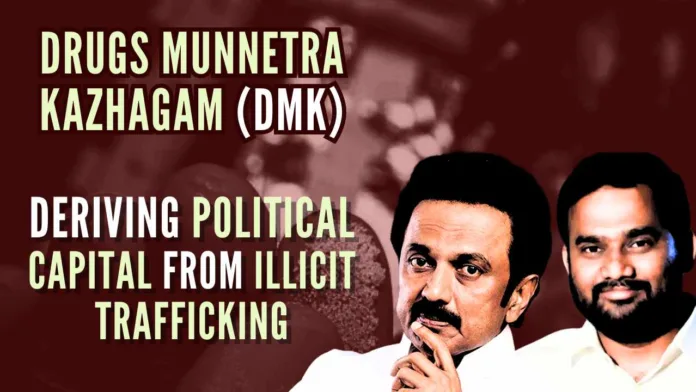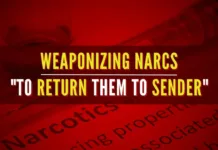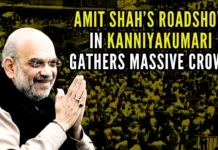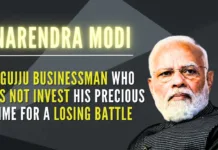
Stranglehold of drug traffickers on political systems and their links to the entertainment industry
An important development that rattled all enforcement agencies in India was the unravelling of an international drugs trafficking network, on February 24, 2024, by the Narcotics Control Board and the Delhi Police, of a gang, operating in Tamil Nadu, that specialized in manufacturing and transporting Pseudoephedrine worth over Rs.2000 crore in the international market over the last three years. A vast network was operating from India with transnational connections to New Zealand, Australia, and Malaysia. The drug trafficking was carried out through air and sea cargo by concealing them in food products such as health mix powder and dry coconuts. The kingpin of this network was Jaffer Sadiq alias Bezos a Chennai resident and Tamil film producer, who also held the post of Deputy Organiser of the Dravida Munnetra Kazhagam’s (DMK) NRI wing for Chennai District-West. After news of his alleged involvement in the drug racket came to light, he was expelled from the DMK party on February 29. He had gone missing soon after the NCB and the Delhi Police Special Cell nabbed three persons in connection with the case. The NCB is also probing suspected political funding using drug money. Sadiq has also produced over five Tamil films and had important connections with certain prominent personalities, including in the Telugu film industry and Bollywood. It is suspected that the cartel led by him, had sent 45 consignments containing approximately 3500 kg of Pseudoephedrine worth over Rs.2000 crore in the international market over the last three years. Pseudoephedrine is a precursor chemical used in the manufacture of Methamphetamine, a dangerous and highly addictive synthetic drug. It is classified as a controlled substance in India, which means there is strict regulation on its production, possession, trade, export, and use.
This sudden development, especially coinciding with the General Elections 2024, brings into sharp focus the stranglehold of drug traffickers on the political system and their linkage with the entertainment industry. There’s overwhelming evidence that drug trafficking, if allowed to flourish undermines security and soon evolves into major threats to political and social stability, the rule of law, human rights, and economic development.
Political parties, angling for various positions, both local and national, should be on guard, to ensure that proceeds of drug trafficking and money laundering do not percolate into political campaigns, which have become hyper-expensive. The government is enthusiastically embracing the global ‘war on drugs’ discourse, propped by international assistance and insistence. The emergence of local political actors’ engagement and involvement in international drug trafficking, can have a negative perception about Indian state authority. The extent of money laundering, estimated in this case alone, to be around Rs.2000 crores, makes channelling illegal proceeds of drug trafficking into mega political campaigns, to gain electoral dominance, an uncomfortable reality. It also adds to deep-rooted suspicions that drug-trafficking organizations are gaining ground as the country is increasingly being used as a major transit hub for narcotics.
One important dimension of the above development is that of State fragility and the decay of administrative, political, judicial, and security institutions, which results in the loss of what Weber (1946: 78) famously termed the “monopoly on the legitimate means of violence”, (Weber Max (1946), Politics as a Vocation, in: Heinrich Gerth Hans, and Wright Mills C. (eds), From Max Weber: Essays in Sociology, London: Routledge, 77–128.)
Institutional decay and violations of the rule of law through formal security providers in fragile states are cause and effect not only of the emergence of informal security actors but also of the advent of drug-trafficking organizations. Political leaders, who compromise, connive, and induct drug traffickers into their political organizations, will have to witness their State becoming into a hub of transnational criminal activities. The expectations of opportunities to penetrate state institutions and the political system, through drug trafficking, will involve more aspirants as well as tacit cooperation from corrupt bureaucrats, enforcement officials, and even the judiciary. The State can quickly crumble to become a collapsed or failed one. In this respect, Koonings and Kruijt (Koonings Kees, and Kruijt Dirk, Armed Actors: Organised Violence and State Failure in Latin America, London, and New York: Zed Books -2004) suggest that the terms “hidden” or “partial” State failure of public security, would be more appropriate. Certain schools of thought, are of the view that it would be more appropriate to speak of “areas of limited statehood”, which “lack the capacity to implement and enforce central decisions and a monopoly on the use of force” (Risse Thomas (2011), Governance Without a State: Policies and Politics in Areas of Limited Statehood, New York: Columbia University Press.) It has been made clear, however, that far from being “ungoverned spaces”, such “black spots” or “brown areas” are under the control of “alternative authority and governance structures” (Stanislawski Bartosz H. (2008), Para-States, Quasi-States, and Black Spots: Perhaps Not States, But Not “Ungoverned Territories” Either, in: International Studies Review, 10, 2, 366–396.) At the same time, it is precisely in such ‘no-go’ zones for government and law-enforcement agencies, that drug traffickers and drug-trafficking organizations, flourish with impunity.
More worrisome is the emergence of politicized, internationalized, and sophisticated “third-generation” descendants of political families, in Tamil Nadu, who keep dabbling in films and politics, like their immediate ancestors, to give a sandwich of power and glamour, to enthrall their party cadres, and thereby ensure the rule of a different kind of monarchy in the guise of a democracy. Such political leadership, whether at the national level or state level, ensures a steady decline in the quality of governance and status.
Tamil Nadu, emerging as a pathway, in the crime-conflict international disorder nexus, can threaten the state politically, by providing an avenue for criminal organizations and drug traffickers to enter the political space, undermining the democratic process. Jaffer Sadiq represents a new breed of drug-money-enriched dons, who want to experience political success, by buying official positions and jobs in political parties. Consequently, the legitimacy of the political process is subverted. The problem perpetuates itself as successful politicians bankrolled with illicit money make it more difficult for other actors to resist participating in the illicit economy, leading to endemic corruption at both the local and national levels. When they intermingle with the entertainment industry as producers, directors, and actors, the population welcomes and tolerates such criminals. Tamil Nadu politicians should not get involved in unwittingly building up a drug empire, that would doom them politically and economically.
Note:
1. Text in Blue points to additional data on the topic.
2. The views expressed here are those of the author and do not necessarily represent or reflect the views of PGurus.
For all the latest updates, download PGurus App.
- Weaponizing Narcs – To Return them to Sender - April 15, 2024
- Silence of political leaders on drug menace in election manifestos – Will Bharat end up under the category of “apparently endangered country”? - April 6, 2024
- Is religious engagement of bulk voters derailing Indian democratic election process? - April 3, 2024










